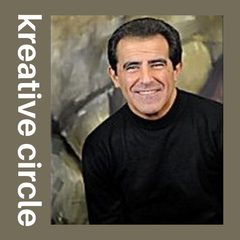Faust, welcome to Kreative Circle!
Please introduce yourself and share with audiences what inspired you to pursue a career in therapy?
Thanks Sasha. This is actually a question I receive quite often. For me, my career path actually chose me at quite an early age. I was the kid everyone came to when they had a problem. I love people, I’m a good listener, and a problem solver. So, for me it was a natural fit.
For individuals contemplating a career in therapy, what is the difference between studying clinical and developmental psychology?
How did studying various forms of psychology impact your approach to human behaviors in your initial therapist role following your academic career?
Clinical psychology is the study and treatment of problematic thoughts and behaviors, It’s often discussed as abnormal psychology, where developmental psychology is the study of normal human development. It’s a good idea to study both branches of the discipline. This gives the therapist a sound understanding of what normal development should look like, and what happens when things go off track. I was fortunate to design my own graduate study program at Illinois State University, and based it around both clinical and developmental psychology with the understanding that it would help me to become a more efficient therapist. Having experience with both normal and abnormal human development, and the good fortune to have worked with many diverse populations, allowed me to experience the human condition from many different perspectives. This always helps a therapist to both develop and implement practical programs to help people change their lives.
As a therapist hosting over thirty years of experience with a positive track record of changing thousands of lives, what have your clients taught you about yourself?
Any good therapist knows that we are only as efficient in our practice, as we are in our own personal life. It’s difficult to help someone else if you, yourself are confused and conflicted. So, the full circle of counseling requires that the counselor be introspective, and always willing to pursue self enhancement. While I’m treating others, I tried to be empathetic which helps me understand not only what my clients are going through, but how the situation can be applied to myself.
Are there any human behaviors that would surprise you in your present state of career, or do you believe you've "heard it all, seen it all"? Have you ever encountered any moments in your career when you considered 'taking a break' to pursue other endeavors?
It’s really a combination of both. Through all the years of counseling, there is a feeling that we have seen most of it, but a good therapist knows that that’s never the case. The key is never to forget that everyone is their own individual life form, they’re all special, and they are all different. In the end, if you look at it this way, everything is new all the time. I’ve always pursued other endeavors, but never took a break in the process. It’s good for all of us to diversify a bit, but we don’t have to stop what we’re doing in order to make that happen.
Your book The Fix Yourself Handbook (winner of the Literary Titan and Non-Fiction book award) discusses the Process Way of Life which comprises 52 internal processes that assist in creating healthy internal balances within oneself. What criteria was used to extract 52 internal processes for implementation?
This goes right back to all those years of counseling. When you do this as long as I have, you hold on to what works, and discard what does not. The way to build any good counseling format is to define and formalize what you’re doing and then put it into a functional program. I saw that every part of life was run by some type of process, from the smallest things we do, to the more grandiose endeavors. Understanding this allowed me to put all those little things that work into a process oriented program. That became the Process Way of Life as presented in The Fix Yourself Handbook.
As a highly acclaimed therapist recognized for your professional contributions on local and state levels in Pennsylvania, how have the therapy programs evolved since the inception of your career? Are there any programs and/or protocols that you would recommend other states to implement that have worked exceptionally well in your state?
Programs don’t really differ that much from state to state. As far as how programs are evolving, I think they’re becoming more eclectic, and less restricted by the older more formal approaches. On the other hand, I also have concerns that the discipline has become “watered down” as we are requiring much less training for those who are counseling others. Today, everyone is a “life coach”. These are, all too often, short programs that do not provide enough solid teaching and experience to produce qualified counselors. The rule of thumb is still a solid and fundamentally sound educational approach, coupled with a diversified experiential training process. Avoid anyone who doesn’t possess both.
For any form of therapy to work, an individual's willingness plays a crucial role in whether the therapies will be effective in the short and long run. Seeking therapy isn't a sign of weakness, it's a supplemental tool to improve one's life. What guidance do you have for individuals that may benefit from therapy yet they are afraid of the social stigma that comes attached with it? What advice do you have for families struggling with a loved one refusing to seek help?
The social stigma really isn't what it used to be. More people are getting involved in therapy, and they're not as ashamed as they used to be. Also, a good therapist is the key to those concerns. Those of us who love what we do, but are also trained to help people through those initial parts of the counseling process, usually see clients that are much more relaxed about the changes they need to make, and about working with us. As far as what to do when someone is refusing to come to counseling, I usually advise that they come one time. This gives them the chance to see what's going to happen in a counseling setting, and gives them control over whether or not they want to come back. Very rarely will someone come into any of my counseling sessions and not return. Personally, I incorporate good listening techniques with a very dynamic approach. This helps to produce the trust that is necessary to not only attract people to the counseling environment, but also, to keep them there .
You've worked at a few counseling centers catering to individuals battling alcoholic and drug addictions. What are a few common variables that are present among all these addicts? Do you believe the twelve step recovery program is effective for all forms of addictions? Can an addict reach a point where no form of therapy will penetrate their being to yield a positive result of recovery?
The evidence about addiction strongly suggests the genetic component, and that's probably the core of the issue. Additionally, we live in a culture these days that is medicine-oriented, and aligns with quick fixes and short-term solutions. Drug addiction produces a quick euphoric response, which is short lived, and has to be reestablished often. When you take a closer look at that, it is, unfortunately, the way we tend to live these days. With drug addiction, however, once the person is in the grasp of the addiction, it's no longer about euphoria. Now it's about “getting right”, and this is nothing more than avoiding the withdrawal nightmare that quickly attaches itself to the addictive process. No program is for everyone, but on the other hand, no program works better with addicts than the 12 step program does. It's not only a program for addiction, but a program for good living. What makes it difficult for many people is that it's not a quick fix. It requires a long term investment. People don't like that. Some addicts do reach a point where nothing is going to help them. That, however, is usually the result of not wanting to do the work, or feel the uncomfortable feelings that come with sobriety. No one ever said it was going to be easy, but it's certainly not impossible.
Out of all the demographics that you've served (from nursing homes, prisons, substance abuse centers and inpatient facilities), which population was the most challenging to work with? Which population greatly contributed to your personal growth?
Addicts and child molesters are the most difficult, and by far, the most resistant to change. As far as the population that contributed to my personal growth, that would be abused women. This required me to stretch past many of my perceived notions about women, abuse, and recovery. In the end, it became the population I love treating the most, and a population I've become very successful treating.
Faust, what do you do for fun when you're not guiding and healing others? You invest your time and energies in listening to the world's thoughts and emotions. What sources serve as your cornerstone of personal faith and inspiration?
I knew early in my career that diversions from the counseling environment would be necessary. I'm an avid sports fan, have worked with Phillies fans for twenty-six years, workout regularly, and I write. In addition, I'm a Christian with a strong faith, and I always have that to guide me through my life. I must say though, I never saw counseling as work. I still love all the people that I have the privilege to work with, and after four decades of doing so, I still look forward to going into the office. In short, for a select few, counseling others is not a job, it's a way of life . For me, I'm one of those people that never worked a day in my life.
Engaging in therapy can be an intimate experience for vulnerable and private souls, what characteristics should individuals seek in an ethical and honorable therapist?
There's someone for everyone. How can one find the right therapist for them? You'll know a counselor is right for you if they are invested in what you're saying, nonjudgmental, and always available. I've always said that I am available 24/7/365. I think all counselors need to take this approach. As far as ethical behavior, there are boundaries in counseling. It should always be safe, nonthreatening, intimate, but always adhering to those boundaries.
Please share with audiences how they can support your work.
Anyone interested in the Process Way of Life which is taught in The Fix Yourself Handbook can find the book on my website, and available on Amazon, Barnes and Noble, and many other retailers. I've also provided links to my website and personal social media pages . The website is dedicated to The Fix Yourself Handbook , and all information about the book can be found there.
My Website: https://www.faustruggiero.com/
Facebook - Personal: https://www.facebook.com/faust.ruggiero/
Facebook - Inspirational: https://www.facebook.com/inspirationalmind
Twitter: https://twitter.com/faustinspire
Please introduce yourself and share with audiences what inspired you to pursue a career in therapy?
Thanks Sasha. This is actually a question I receive quite often. For me, my career path actually chose me at quite an early age. I was the kid everyone came to when they had a problem. I love people, I’m a good listener, and a problem solver. So, for me it was a natural fit.
For individuals contemplating a career in therapy, what is the difference between studying clinical and developmental psychology?
How did studying various forms of psychology impact your approach to human behaviors in your initial therapist role following your academic career?
Clinical psychology is the study and treatment of problematic thoughts and behaviors, It’s often discussed as abnormal psychology, where developmental psychology is the study of normal human development. It’s a good idea to study both branches of the discipline. This gives the therapist a sound understanding of what normal development should look like, and what happens when things go off track. I was fortunate to design my own graduate study program at Illinois State University, and based it around both clinical and developmental psychology with the understanding that it would help me to become a more efficient therapist. Having experience with both normal and abnormal human development, and the good fortune to have worked with many diverse populations, allowed me to experience the human condition from many different perspectives. This always helps a therapist to both develop and implement practical programs to help people change their lives.
As a therapist hosting over thirty years of experience with a positive track record of changing thousands of lives, what have your clients taught you about yourself?
Any good therapist knows that we are only as efficient in our practice, as we are in our own personal life. It’s difficult to help someone else if you, yourself are confused and conflicted. So, the full circle of counseling requires that the counselor be introspective, and always willing to pursue self enhancement. While I’m treating others, I tried to be empathetic which helps me understand not only what my clients are going through, but how the situation can be applied to myself.
Are there any human behaviors that would surprise you in your present state of career, or do you believe you've "heard it all, seen it all"? Have you ever encountered any moments in your career when you considered 'taking a break' to pursue other endeavors?
It’s really a combination of both. Through all the years of counseling, there is a feeling that we have seen most of it, but a good therapist knows that that’s never the case. The key is never to forget that everyone is their own individual life form, they’re all special, and they are all different. In the end, if you look at it this way, everything is new all the time. I’ve always pursued other endeavors, but never took a break in the process. It’s good for all of us to diversify a bit, but we don’t have to stop what we’re doing in order to make that happen.
Your book The Fix Yourself Handbook (winner of the Literary Titan and Non-Fiction book award) discusses the Process Way of Life which comprises 52 internal processes that assist in creating healthy internal balances within oneself. What criteria was used to extract 52 internal processes for implementation?
This goes right back to all those years of counseling. When you do this as long as I have, you hold on to what works, and discard what does not. The way to build any good counseling format is to define and formalize what you’re doing and then put it into a functional program. I saw that every part of life was run by some type of process, from the smallest things we do, to the more grandiose endeavors. Understanding this allowed me to put all those little things that work into a process oriented program. That became the Process Way of Life as presented in The Fix Yourself Handbook.
As a highly acclaimed therapist recognized for your professional contributions on local and state levels in Pennsylvania, how have the therapy programs evolved since the inception of your career? Are there any programs and/or protocols that you would recommend other states to implement that have worked exceptionally well in your state?
Programs don’t really differ that much from state to state. As far as how programs are evolving, I think they’re becoming more eclectic, and less restricted by the older more formal approaches. On the other hand, I also have concerns that the discipline has become “watered down” as we are requiring much less training for those who are counseling others. Today, everyone is a “life coach”. These are, all too often, short programs that do not provide enough solid teaching and experience to produce qualified counselors. The rule of thumb is still a solid and fundamentally sound educational approach, coupled with a diversified experiential training process. Avoid anyone who doesn’t possess both.
For any form of therapy to work, an individual's willingness plays a crucial role in whether the therapies will be effective in the short and long run. Seeking therapy isn't a sign of weakness, it's a supplemental tool to improve one's life. What guidance do you have for individuals that may benefit from therapy yet they are afraid of the social stigma that comes attached with it? What advice do you have for families struggling with a loved one refusing to seek help?
The social stigma really isn't what it used to be. More people are getting involved in therapy, and they're not as ashamed as they used to be. Also, a good therapist is the key to those concerns. Those of us who love what we do, but are also trained to help people through those initial parts of the counseling process, usually see clients that are much more relaxed about the changes they need to make, and about working with us. As far as what to do when someone is refusing to come to counseling, I usually advise that they come one time. This gives them the chance to see what's going to happen in a counseling setting, and gives them control over whether or not they want to come back. Very rarely will someone come into any of my counseling sessions and not return. Personally, I incorporate good listening techniques with a very dynamic approach. This helps to produce the trust that is necessary to not only attract people to the counseling environment, but also, to keep them there .
You've worked at a few counseling centers catering to individuals battling alcoholic and drug addictions. What are a few common variables that are present among all these addicts? Do you believe the twelve step recovery program is effective for all forms of addictions? Can an addict reach a point where no form of therapy will penetrate their being to yield a positive result of recovery?
The evidence about addiction strongly suggests the genetic component, and that's probably the core of the issue. Additionally, we live in a culture these days that is medicine-oriented, and aligns with quick fixes and short-term solutions. Drug addiction produces a quick euphoric response, which is short lived, and has to be reestablished often. When you take a closer look at that, it is, unfortunately, the way we tend to live these days. With drug addiction, however, once the person is in the grasp of the addiction, it's no longer about euphoria. Now it's about “getting right”, and this is nothing more than avoiding the withdrawal nightmare that quickly attaches itself to the addictive process. No program is for everyone, but on the other hand, no program works better with addicts than the 12 step program does. It's not only a program for addiction, but a program for good living. What makes it difficult for many people is that it's not a quick fix. It requires a long term investment. People don't like that. Some addicts do reach a point where nothing is going to help them. That, however, is usually the result of not wanting to do the work, or feel the uncomfortable feelings that come with sobriety. No one ever said it was going to be easy, but it's certainly not impossible.
Out of all the demographics that you've served (from nursing homes, prisons, substance abuse centers and inpatient facilities), which population was the most challenging to work with? Which population greatly contributed to your personal growth?
Addicts and child molesters are the most difficult, and by far, the most resistant to change. As far as the population that contributed to my personal growth, that would be abused women. This required me to stretch past many of my perceived notions about women, abuse, and recovery. In the end, it became the population I love treating the most, and a population I've become very successful treating.
Faust, what do you do for fun when you're not guiding and healing others? You invest your time and energies in listening to the world's thoughts and emotions. What sources serve as your cornerstone of personal faith and inspiration?
I knew early in my career that diversions from the counseling environment would be necessary. I'm an avid sports fan, have worked with Phillies fans for twenty-six years, workout regularly, and I write. In addition, I'm a Christian with a strong faith, and I always have that to guide me through my life. I must say though, I never saw counseling as work. I still love all the people that I have the privilege to work with, and after four decades of doing so, I still look forward to going into the office. In short, for a select few, counseling others is not a job, it's a way of life . For me, I'm one of those people that never worked a day in my life.
Engaging in therapy can be an intimate experience for vulnerable and private souls, what characteristics should individuals seek in an ethical and honorable therapist?
There's someone for everyone. How can one find the right therapist for them? You'll know a counselor is right for you if they are invested in what you're saying, nonjudgmental, and always available. I've always said that I am available 24/7/365. I think all counselors need to take this approach. As far as ethical behavior, there are boundaries in counseling. It should always be safe, nonthreatening, intimate, but always adhering to those boundaries.
Please share with audiences how they can support your work.
Anyone interested in the Process Way of Life which is taught in The Fix Yourself Handbook can find the book on my website, and available on Amazon, Barnes and Noble, and many other retailers. I've also provided links to my website and personal social media pages . The website is dedicated to The Fix Yourself Handbook , and all information about the book can be found there.
My Website: https://www.faustruggiero.com/
Facebook - Personal: https://www.facebook.com/faust.ruggiero/
Facebook - Inspirational: https://www.facebook.com/inspirationalmind
Twitter: https://twitter.com/faustinspire















